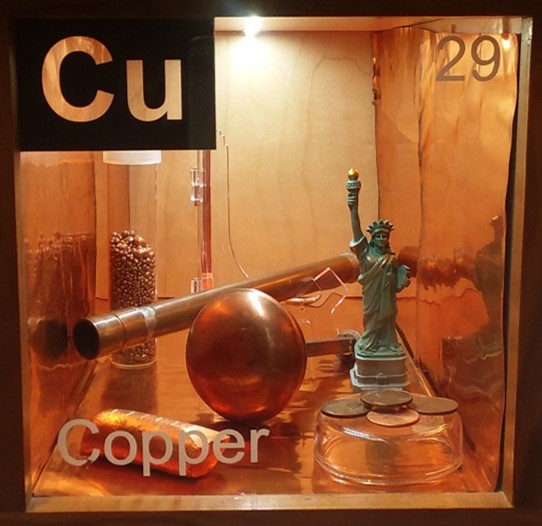Copper

Contributor: The copper display box is dedicated to the memory of Richard Basel.
About the Display: This display features:
- A replica of the Statue of Liberty -
"Give me your poor, your tired, your huddled masses yearning to breathe free, the wretched refuse of your teeming shore. Send these, the homeless, tempest-tossed to me, I lift my lamp beside the golden door!"
is made of iron frame with pure copper metal draped over it. The copper has oxidized, which is why the statue appears green!
- Copper pennies-one is from 1981, the last year that pennies actually contained copper*
- Copper sheeting-donated in remembrance of Dr. Richard Basel
- Pure copper metal
- Copper pipe
- An antique copper doorknob - doorknobs in hospitals used to be made of copper due to its antimicrobial properties**
Interesting Facts about Copper:
- The US Geological Survey estimates that every American born in 2008 alone will use 1,309 pounds (593.75 kg) of copper during their lifetime for necessities, lifestyles, and health.
- Copper is easily alloyed with other metals, accounting for over 570 different alloys listed with the American Society for Testing and Materials International! Brasses, one of the most well-known, are alloyed with zinc. Bronzes, another readily recognized group of alloys, contain copper with tin, aluminum, silicon or beryllium.
- One of the most famous Dead Sea Scrolls is made of copper! Instead of biblical scriptures or other religious writings, it contains clues to an as of yet undiscovered treasure!
- *A penny only contains a measly 2.6% of copper! Starting in 1982, the US Mint began producing a mostly zinc alloy in place of the 95% copper penny. The predominately zinc pennies are coated with copper to maintain their appearance.
- The "silver" US coins actually contain more copper than the "copper" pennies! A nickel contains 75% copper, while dimes, quarters, and half-dollars contain 91.67% copper!
- Copper is important to your health! A copper deficiency can lead to an increased risk of developing high cholesterol and coronary heart disease! It is also associated with premature birth, chronic diarrhea, and stomach diseases.
- By April of 2011, the EPA approved the registration of 355 antimicrobial copper alloys! This means that public health claims that copper, brass and bronze are capable of killing harmful and/or potentially deadly bacteria are now permitted.
- **Studies and testing showed that copper alloys that contain 65% or more copper are effective against Methicillin-resistant Staphylococcus aureus (MRSA), Staphylococcus aureus, Vancomycin-resistant Enterococcus faecalis (VRE), Enterobacter aerogenes, Escherichia coli O157:H7, and Pseudomonas aeruginosa, all of which are considered to represent the most dangerous pathogens capable of causing severe and often fatal infections.
- Copper is a green building material. It has one of the highest recycling rates of any engineering material, making it very unlikely to ever land up in a landfill.
- Copper conducts electricity better than any other metal (except silver). Because of this, it is the standard benchmark for electrical conductivity.
For these and many other interesting facts about copper, visit https://www.copper.org/education/c-facts/

About the Contributor: Richard Basel was the founder of Lebensmittel Consulting, Fostoria, which he also operated for nearly 33 years. A food and research scientist and consultant, Dr. Basel utilized several different types of elements in his lab. Among his collection were the copper sheeting (pictured above), cadmium rods, and magnesium ribbon which were graciously donated to the Living Science display by his wife, Peggy Basel.
Back to the Periodic Table
Symbol: Cu
Atomic Number: 29
Atomic Mass: 63.546 u
Electron Configuration: [Ar] 3d104s1
Year Discovered: known since ancient times!
Discovered By: unknown!


